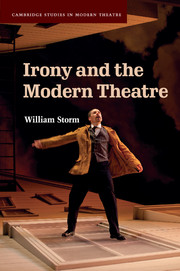Book contents
- Frontmatter
- Contents
- Acknowledgements
- Introduction
- 1 Irony personified: Ibsen and The Master Builder
- 2 The character of irony in Chekhov
- 3 Irony and dialectic: Shaw's Candida
- 4 Pirandello's “Father” – and Brecht's “Mother”
- 5 Absurdist irony: Ionesco's “anti-play”
- 6 “Ironist First Class”: Stoppard's Arcadia
- 7 American ironies: Wasserstein and Kushner
- 8 Irony's theatre
- Notes
- Works cited
- Index
8 - Irony's theatre
Published online by Cambridge University Press: 01 June 2011
- Frontmatter
- Contents
- Acknowledgements
- Introduction
- 1 Irony personified: Ibsen and The Master Builder
- 2 The character of irony in Chekhov
- 3 Irony and dialectic: Shaw's Candida
- 4 Pirandello's “Father” – and Brecht's “Mother”
- 5 Absurdist irony: Ionesco's “anti-play”
- 6 “Ironist First Class”: Stoppard's Arcadia
- 7 American ironies: Wasserstein and Kushner
- 8 Irony's theatre
- Notes
- Works cited
- Index
Summary
Irony, to be sure, does not belong solely to the theatre or only to modernity. Its connections with language and speech alone, not to mention the several philosophical contexts and perspectives, are so fundamental as to insure an ironic presence in discourse generally as well as in literary and theatrical artistry. Still, theatre and drama incorporate irony in notably singular ways, and the settings of modernism and of the contemporary stage have provided exemplary occasions, not only for the ironic mode to be usefully employed but also for it to be reassessed with regard to its notable tendencies and strengths as well as potential immediacy of application. Irony in the theatre is, of course, an ancient as well as transhistorical phenomenon. What, again, could be more starkly ironic than Oedipus setting out to locate the cause of the plague on his city, complete with his self-description as “luck's child”? Oedipus, in his narrowing quest, enacts and also embodies an ironic fate: his personal role in events is built into his history, as is his blindness to the circumstances. In another epoch, the terrible irony of Lear's turning against his favorite child could scarcely produce a more cataclysmic outcome. And yet, irony in its modern iterations, and for characters in theatre more recently, is not the same as it was for Sophocles or Shakespeare.
- Type
- Chapter
- Information
- Irony and the Modern Theatre , pp. 208 - 224Publisher: Cambridge University PressPrint publication year: 2011



